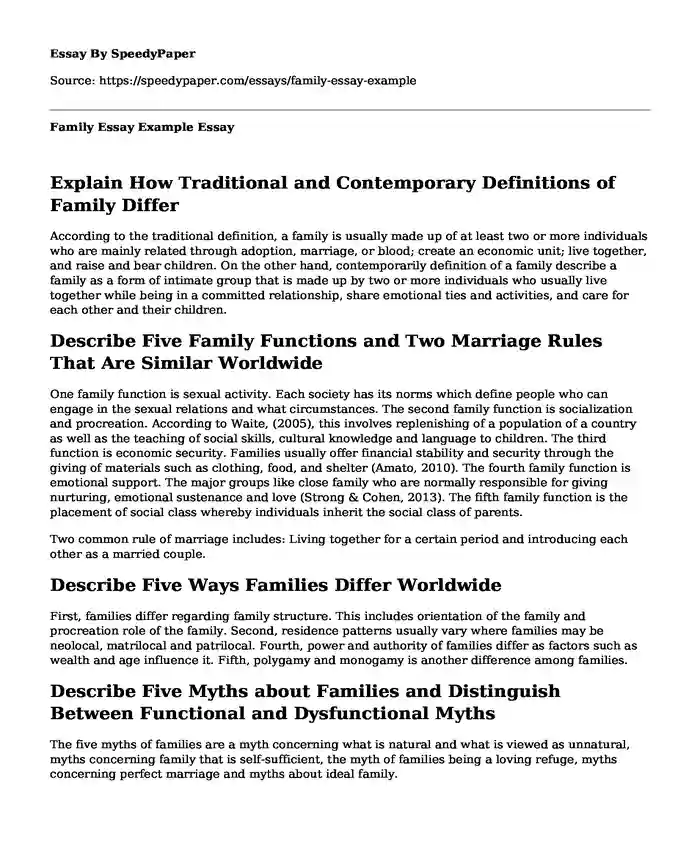Explain How Traditional and Contemporary Definitions of Family Differ
According to the traditional definition, a family is usually made up of at least two or more individuals who are mainly related through adoption, marriage, or blood; create an economic unit; live together, and raise and bear children. On the other hand, contemporarily definition of a family describe a family as a form of intimate group that is made up by two or more individuals who usually live together while being in a committed relationship, share emotional ties and activities, and care for each other and their children.
Describe Five Family Functions and Two Marriage Rules That Are Similar Worldwide
One family function is sexual activity. Each society has its norms which define people who can engage in the sexual relations and what circumstances. The second family function is socialization and procreation. According to Waite, (2005), this involves replenishing of a population of a country as well as the teaching of social skills, cultural knowledge and language to children. The third function is economic security. Families usually offer financial stability and security through the giving of materials such as clothing, food, and shelter (Amato, 2010). The fourth family function is emotional support. The major groups like close family who are normally responsible for giving nurturing, emotional sustenance and love (Strong & Cohen, 2013). The fifth family function is the placement of social class whereby individuals inherit the social class of parents.
Two common rule of marriage includes: Living together for a certain period and introducing each other as a married couple.
Describe Five Ways Families Differ Worldwide
First, families differ regarding family structure. This includes orientation of the family and procreation role of the family. Second, residence patterns usually vary where families may be neolocal, matrilocal and patrilocal. Fourth, power and authority of families differ as factors such as wealth and age influence it. Fifth, polygamy and monogamy is another difference among families.
Describe Five Myths about Families and Distinguish Between Functional and Dysfunctional Myths
The five myths of families are a myth concerning what is natural and what is viewed as unnatural, myths concerning family that is self-sufficient, the myth of families being a loving refuge, myths concerning perfect marriage and myths about ideal family.
Functional myths are myths which divert the people's attention from greater social issues which people cannot control while dysfunctional myths are myths that make people blame themselves whenever they fail attaining the expected image of a perfect family.
References
Amato, P. R. (2010). The MarriageGoRound: The State of Marriage and the Family in America Today by Andrew J. Cherlin. Journal of Marriage and Family, 72(5), 1455-1457.
Strong, B., & Cohen, T. F. (2013). The marriage and family experience: Intimate relationships in a changing society. Cengage Learning.
Waite, L. J. (2005). Marriage and family. In Handbook of the population (pp. 87-108). Springer, Boston, MA.
Cite this page
Family Essay Example. (2022, Jul 13). Retrieved from https://speedypaper.net/essays/family-essay-example
Request Removal
If you are the original author of this essay and no longer wish to have it published on the SpeedyPaper website, please click below to request its removal:
- Qatar Economy Overview in This Free Essay for Students
- Free Essay on the Difference between Gender and Sex
- Research Paper Example on the Programs for Alcohol Prevention among the Youth
- HRM Essay Example on Employee Engagement Strategies
- Essay Sample Focusing on Cryptocurrency Taxation in Australia
- What Would You Do Differently if You Were President? Free Essay
- Time Management Development - Free Essay Sample
Popular categories





